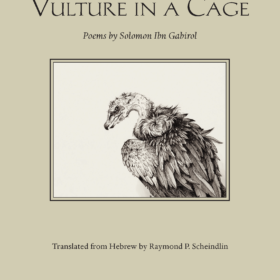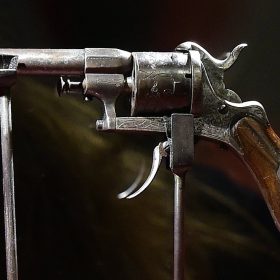-

News that Stays News from the 11th Century
The poems below are from Vulture in a Cage: Poems by Solomon Ibn Gabirol, translated from the Hebrew by Raymond P. Scheindlin. A beautiful and challenging poet, Ibn Gabirol seems strikingly modern in his methods, at least as brought over into English by Scheindlin. For more information, see Mitchell Abidor‘s fine review of Vulture in a Cage here. Behold the rose: Her body’s like her garment. When you look at her, she blushes like a bride before her husband, or like a girl who runs out screaming, her hands upon her head in horror. * Bring me to the vineyard, friend.Read More
-

A Holiday Gift Idea
If you’ve got €60,000 lying around, consider bidding on the pistol that Paul Verlaine used in his attempt to murder Arthur Rimbaud.Read More
-

Rimbaud in Java
It’s long been known that Rimbaud journeyed to Java in the spring of 1876, a few months after the death of his beloved sister Vitalie. That voyage hasn’t received much attention, though, until Jamie James turned his attention to it in 2011’s Rimbaud in Java: The Lost Voyage. It’s a beautifully designed, brief but fascinating book, more about Rimbaud’s world in 1876 than about his journey, since the details of that are scarce. What James does is piece together likelihoods with a brilliant Sherlock Holmesian zeal.Read More
-

Tin Ear
Rimbaud (who did nothave a tin ear) It’s statements like this that drive me nuts—at least when I’m in a certain mood: The poem [Paul Schmidt’s translation of Rimbaud’s “Le Bateau ivre”] starts with I drifted on a river I could not control. In the other of my most favorite translations, Samuel Beckett begins with Downstream on impassive rivers suddenly. Two magnificent and very different first lines, but rhythmically not that far apart. The statement is by Norma Cole, a widely-published poet and academic who teaches at the University of San Francisco.Read More
-

Rimbaud par Ernest Pignon-Ernest
I ran across this image of Rimbaud on Al Filreis’s blog… … and thanks to the image’s filename was able to track down the artist, Ernest Pignon-Ernest, whom I’d never heard of. What a gap in my awareness! I highly recommend a visit to his site.Read More
-

Re: The Plumbline School
I was a bit surprised to receive an email from Henry Gould of The Plumbline School, inviting me (at the suggestion of Plumbline fellow Joseph Duemer) to join their circle. My response was essentially a reaction to the School’s self-definition, to wit: “Plumbline poetry” is provisionally defined here as poetry which exhibits a stylistic “mean between extremes”: understated, transparent, inclusive, objective. It avoids extremes of both the ponderous and the superficial; it shuns mannerism and facile ornamentation, on behalf of clarity and simplicity of presentation. It strives for mimesis rather than pantomime.Read More
-

Gleanings from Bonnefoy’s Rimbaud
In the post just previous I mentioned Yves Bonnefoy’s wonderful study Rimbaud, and while it’s far too concentrated to comment on in detail, I thought I’d offer a few quotes from it related to poetry in general: Genius, at least where poetry is concerned, consists precisely in being faithful to freedom. * It will suffice that words refuse to be concepts; that they keep themselves from serving; that they disappoint man’s propensity towards empirical observation in order to remain as much as possible in the light of the unnamed.Read More
-

A Rimbaud Stratagem
What is it about certain books that we buy and then leave untouched on the shelf? Or books we open now and then, sample a few paragraphs, then close and reshelve, temporizing: “Not in the mood”; “Too serious for summer”; “I need to read more about the period before trying this one”; “I need to learn French first.” But you never learn French. And yet finally—many years after buying the book—a strategem comes to mind, and a few days later you’ve read it, enjoyed it, been somehow awakened by it.Read More

 Joseph Hutchison, Colorado Poet Laureate 2014-2019, has published 20 collections of poems and edited or co-edited three poetry anthologies. He currently directs two master’s-level programs for University College at the University of Denver: Professional Creative Writing and Arts & Culture Management. Joe lives with his wife, Melody Madonna, in the mountains southwest of Denver, Colorado, the city where he was born.
Joseph Hutchison, Colorado Poet Laureate 2014-2019, has published 20 collections of poems and edited or co-edited three poetry anthologies. He currently directs two master’s-level programs for University College at the University of Denver: Professional Creative Writing and Arts & Culture Management. Joe lives with his wife, Melody Madonna, in the mountains southwest of Denver, Colorado, the city where he was born. 









